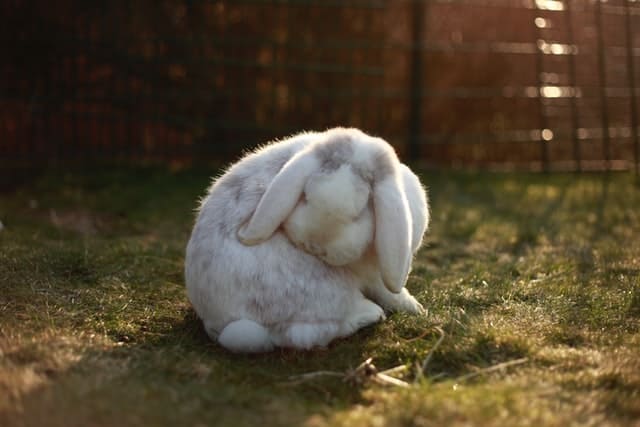
Rabbit bites are not common. since they are animals with few aggressiveness problems. Healthy and happy rabbits are not usually aggressive. Sometimes, however, even if your rabbit is well cared for, it may lunge or take a good bite. To understand this behaviour and the reasons why your rabbit bites you, you first have to understand the nature of rabbits.
- Rabbits are a species that acts as “prey” in their natural environment. They spend much of their time in a state of alert and they feel safe when they are underground, in their burrows; They react quickly and abruptly to any stimulus they perceive as threatening, fleeing and hiding underground. Despite their domestic nature, rabbits that are at home still retain part of this instinct.
- In wild conditions they live in colonies, with subgroups of 2-8 specimens where a male will be the dominant; When male offspring mature, they are expelled from the group.
- It is a twilight species: they are most active at dawn and dusk. The rest of the time they will rest. In order to respect this natural cycle, we will focus our attention and provide food at the busiest times of the day.
Causes why your rabbit bites you
Natural instinct: fear
Most of the reasons why your rabbit can bite you have their roots in fear since when they are free they are prey to many predators and it is something that is recorded in their DNA. So if you chase them, hold them back, or subject them to loud and unpredictable movements, they can feel attacked and this is quite traumatic for them.
How to know if your rabbit is afraid?
If you notice that your rabbit has bristly hair and eyes are wider than usual, your rabbit may be afraid of something. To gain its confidence and to calm them down in this circumstance, we recommend that you lie down on the floor with them and speak to them in a soft and loving tone. If it continues to have an aggressive attitude, you can try an approach with its favourite food, placing it in the palm of your hand while you caress them. This will help your rabbit relax and gain confidence with you.
Inappropriate or excessive handling
Improper or excessive handling can make the rabbit feel uncomfortable and end up biting its owner’s hands. They have a strong and fast bite that can involve tendon or even bone damage.
Lack of trust
Generally, this small aggression caused by a rabbit can be produced by a lack of trust towards people, that is, the rabbit feels a threat and reacts with a growl or a warning bite.
Cleaning its cage or corner
Another cause why they attack your foot or hand is when you try to clean their cage or corner, since you are invading their territory. This is more common in female rabbits. Avoid trying to defend its space by taking them to another room and keep them entertained.
Call for attention
A rabbit may also chew on your hands and feet when it wants to draw attention to you to offer it food. Try not to reinforce this behaviour by giving them what they want, push them gently, and wait half an hour before offering them some food. Maintaining an eating routine also helps. Your rabbit will quickly learn its feeding schedule, and if you avoid giving treats in between, it will stop them from begging for food between meals.
Non-Neutered or Sterilized Rabbits
Rabbits that have not been neutered or spayed are much more likely to have behavioural problems, caused by territoriality and / or sexual frustration. There is very little chance of having a calm rabbit after 4 months of age if they are not spayed. Think of the human adolescent. Your rabbit is growing, hormones are in control, and your rabbit is changing.
Sexual maturity will cause a complete change in the behavior of your rabbit, this will happen even more in female rabbits. Affectionate baby rabbits can turn into aggressive rabbits that bite frequently.
Male rabbits are less likely to direct their hormonal aggression towards us, only towards other rabbits. Females, on the other hand, are much more unpredictable.
Medical problems, you feel pain
Pain or illness increases irritability in all animals and reduces their ability to tolerate mildly stressful situations.
If your rabbit shows aggressiveness it should first receive a full veterinary checkup. Treatment will vary depending on the diagnosis.
Love bites
Bites do not always mean that your rabbit is angry, rabbit bites can be a sign of affection. This is one of the ways your rabbit has to show you how much he loves you. To know if it is really a love bite, you have to know if it is usually accompanied by licking and that your bunny is calm.
How to prevent your rabbit from biting you?
Giving rabbits independence, space for freedom of movement, and the option to interact or not will teach them that they have nothing to fear. You can put this into action by spending a lot of time on the ground with your rabbit. Let your rabbit feel comfortable just being close to you before trying to touch or pet them.
Fortunately, there are ways to help shy or aggressive bunnies get used to your touch. Gently pet them while you feed them, and don’t chase them or react negatively if they decide to run away or hide.
One trick is to reserve special treats, like dandelion leaves or fresh herbs, for these situations, so that an association is formed between your presence and a reward.
Keep calm, rabbit bites do not spread disease
If, for whatever reason, you are bitten by a rabbit, you can rest easy. In principle, home rabbits do not spread diseases. On rare occasions, they can transmit Pasteurella multocida , which causes pasteurellosis, but this disease is only common in poorly managed rabbit farms.
Before a rabbit bite, the first thing to do is wash the wound properly with plenty of water and neutral soap. In this way, we prevent the entry of microorganisms into the wound and reduce the bacterial load that may exist on the skin. The use of antibiotics in this type of bite is not recommended, the frequency of infection is minimal. By taking them, we could create a bigger problem, such as resistance to antibiotics.






